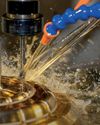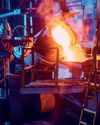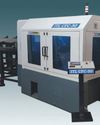
THE INTERPLAY OF EMERGING TECHNOLOGIES is changing the world of manufacturing fast. It is unfolding new choices and challenges at an unprecedented pace and scale. Earlier, there were a fistful of options to make a product. Now, the same thing can be done using a variety of configurations, blending the old ways and the new, to develop efficiencies throughout the value chain. But factory heads cannot keep changing the machinery every time there’s a new one in the market. Nor one can change the processes overnight to accommodate a new intervention. It will only complicate production and affect downstream functions.
The decision one needs to make is to maximise the output from existing assets by improving efficiencies. It is difficult because a) achieving 100% production capacity is dependent on supply dynamics and b) associated cost of production like utilities (air, water, fuel) also have fluctuating prices. By using fewer resources and maximising output, manager can delay decommissioning machines by a few years until there’s something completely disruptive that beats the legacy setup by a factor of two or three (at least).
Aging machines, if well kept, can achieve 1.3x of their installed capacity. It just requires conscious interventions by controlling external variable inputs that can mitigate redundancies and exploit latent potential. This is because the machines (which are now aging) were designed within the constraints of tech available then. Same is the case with latest machines now. They function within the limits of resources available today.
For FMCG companies, which foray into new markets and are required to introduce innovative products, it is a challenge to make their factories achieve the same level of efficiencies every time the products or markets change. The spectrum is crowded with competitors ready to encroach the shelf space.
This story is from the {{IssueName}} edition of {{MagazineName}}.
Start your 7-day Magzter GOLD free trial to access thousands of curated premium stories, and 9,000+ magazines and newspapers.
Already a subscriber ? Sign In
This story is from the {{IssueName}} edition of {{MagazineName}}.
Start your 7-day Magzter GOLD free trial to access thousands of curated premium stories, and 9,000+ magazines and newspapers.
Already a subscriber? Sign In

Multiphysics modelling in manufacturing
Multiphysics modelling is transforming manufacturing processes by improving precision and efficiency, as highlighted in the recent Manufacturing Today webinar, 'Multiphysics Modeling of Manufacturing Processes Using COMSOL\".

Revolutionising the automotive industry: Embracing 14.0 with AI & IOT
Advanced robotics is expected to handle 75% of production tasks by 2025, and AI-powered systems are improving quality control and reducing human intervention.

Adopting green chemistry
Adopting green chemistry is key for Indian manufacturers to drive sustainability and enhance their competitive edge.

A cleaner future for coolants
From extending equipment life to minimising environmental impact, the latest innovations in coolants and lubricants are redefining their role, transforming manufacturing in both operational and sustainable ways.

Forging growth and innovation
Kirloskar Ferrous Industries (KFIL) is driving growth in alloy steel and casting by advancing India's foundry and manufacturing capabilities, aiming to reach $2 billion by 2030. Sujatha Vishnuraj, Editor, Manufacturing Today in conversation with Ravindranath Gumaste, MD, KFIL, to know more about the company's commitment to sustainability and growth.

From Locksto Liftoff
A journey that began with a modest lock manufacturing unit has now evolved into one of India's premier multinational conglomerates.

Top 10 digital transformation strategies for manufacturing
In today's rapidly changing industrial landscape, digital transformation is critical for manufacturing companies aiming to increase efficiency, remain competitive, and enhance customer satisfaction.

Analytics in action
Advances in IoT and automation are transforming the testing, measurement and instrumentation industry, resulting in operational efficiency, data accuracy, and sustainability practices.

ITL-CFC 50: Revolutionising metalworking with high-precision cutting, facing, and chamfering
The ITL-CFC 50 Cutting Facing Chamfering Machine stands out as a highly efficient solution for metalworking industries, offering cutting-edge technology for precision operations.

MRF opens new Tyredrome service centre in Mumbai
The Tyredrome of MRF is manned and run by engineers and technicians trained at MRF.